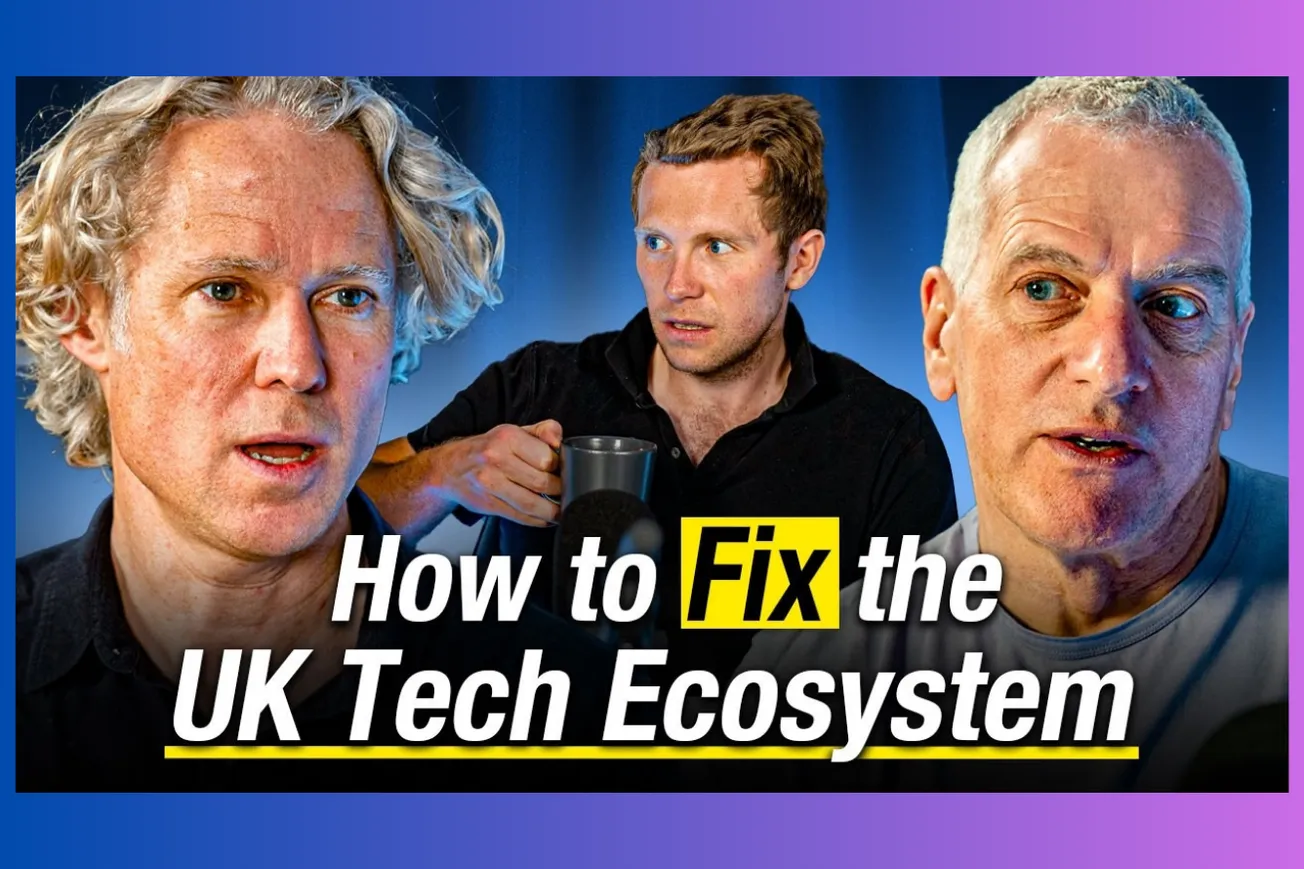Table of Contents
Tom Hulme and Stan Boland unpack what makes visionary founders like Jensen Huang exceptional—and why the UK’s tech ecosystem must evolve to support more of them.
Key Takeaways
- Jensen Huang’s journey illustrates how endurance, product obsession, and visionary patience can reshape an entire industry.
- The UK’s fragmented and risk-averse ecosystem fails to match this ambition, especially for deep tech and frontier innovation.
- World-class founders need access to long-duration capital and mentors who understand scale, not early exits.
- Europe’s conservative LP structures and short-term pressure often cut off growth just as momentum builds.
- For UK tech to thrive globally, it must double down on technical excellence, founder-first ecosystems, and capital aligned to long-term thinking.
Jensen Huang: Visionary Leadership Without Expiry
- Jensen Huang’s success at NVIDIA wasn’t born from a single product bet—it evolved through decades of resilience, technological foresight, and people-first leadership.
- Tom Hulme notes how rare it is to find a founder-CEO who not only survives across multiple industry shifts but actually thrives through them. Huang did.
- He built NVIDIA from a niche GPU player into a foundational layer of modern AI infrastructure—and stayed grounded while doing it.
- Boland emphasizes that Huang’s leadership wasn’t just technical. He possessed emotional range—balancing intense vision with humility, attracting not just engineers but believers.
- He doubled down on risky decisions, like CUDA, long before the world understood them. Today, that bet underpins much of AI computation.
- Crucially, Huang’s long tenure allowed him to see ideas mature across cycles—something rare in public market leadership today.
- Founders in the UK often get replaced after Series B or IPO. Huang shows what’s possible when a founder compounds value over decades.
UK Tech’s Systemic Constraints and Cultural Gaps
- Despite a high concentration of world-class technical talent, the UK startup ecosystem punches below its weight in scale-stage impact.
- Hulme and Boland argue that capital misalignment is the root issue. Too much early-stage enthusiasm followed by a cliff of late-stage drought.
- Institutional investors in the UK tend to be risk-averse and measure returns in 3–5 year cycles—not the 10–15 years needed for truly transformational ventures.
- Boland highlights that in deep tech, a five-year outlook is like judging a tree by its sapling. It kills potential before it can take root.
- Government efforts remain fragmented—many pilot programs, few bold systemic plays. Unlike the U.S., there’s no central innovation flywheel in the UK.
- And even when UK founders secure funding, the cultural bias toward "not making a fuss" can throttle their storytelling, hiring, and investor magnetism.
- Hulme sees this cultural humility as a double-edged sword. While it guards against hype, it can stifle boldness at the exact moments it's needed most.
Rewiring the Investment Culture for Long-Term Success
- At the core of Jensen Huang’s legacy is patient capital—investors who understood that generational companies take time, iteration, and resilience.
- Boland urges UK investors to adopt a similar mindset: fund companies not just to exit, but to endure.
- That means less emphasis on cohort IRR and more on enduring category creation. It means fewer copycats and more moonshots.
- UK investors must also move beyond check-writing and become active long-term partners: coaches, connectors, and counterweights to founder doubt.
- This shift can’t just happen at the VC level—it needs LPs to fund multi-cycle strategies and accept that tech innovation moves on a different clock.
- Many of the most iconic American companies—Amazon, Tesla, even NVIDIA—took over a decade to find real momentum. But when they did, they reshaped industries.
- UK capital must make room for these trajectories. Because the next one might already be here—but stuck at the seed stage.
The Narrative Edge: Storytelling as a Strategic Lever
- Both Hulme and Boland underscore the power of founder narrative—not just for marketing, but for strategy.
- Jensen Huang built a compelling arc around NVIDIA, keeping investors, employees, and customers aligned across market shifts.
- Storytelling, when authentic, helps founders recruit talent, close capital, and make bold pivots without losing stakeholder belief.
- UK founders often struggle with this. The cultural instinct to understate leaves too many great products under-recognized.
- Initiatives like Entrepreneur First help train this muscle, but Hulme insists it must become a systemic part of startup support.
- Narrative isn’t fluff—it’s structure. It clarifies why a company exists, what it will become, and why now is the moment to back it.
- The ecosystem must empower founders to speak audaciously without being dismissed as arrogant or unserious.
Talent, Mentorship, and the Compound Effect of Experience
- Jensen Huang’s consistency also stems from retaining world-class talent—and letting them grow into increasingly strategic roles.
- In the UK, this kind of talent continuity is rare. Too often, founders are advised to replace themselves just as the stakes rise.
- Hulme calls for more operator-led mentorship, where experienced builders guide startups through not just fundraising, but operational maturity.
- Boland adds that real mentorship isn’t transactional—it’s proximity. It’s sharing failure patterns, context switching, and resilience under pressure.
- The UK must build this layer of support at scale, especially in technical domains where founders are solving unknown problems.
- Founders who get the right guidance early are more likely to stay in the game longer—and compound their insight into enduring leadership.
The UK tech ecosystem doesn’t lack talent—it lacks the patience, cultural infrastructure, and capital strategy to support visionary founders across decades. If the UK wants to produce its own Jensens, it must stop optimizing for quick wins and start compounding ambition.





